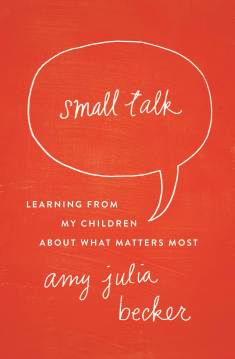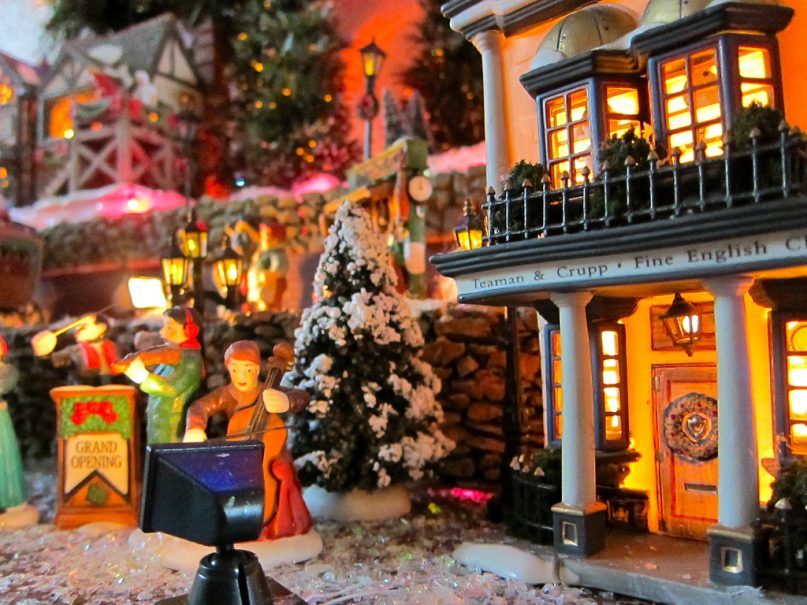Christmas is nigh upon us and hundreds of thousands of children will likely hear the clip-clop of reindeer hooves on their rooftops tonight. Amid the holiday hoopla, some Christians have perennial gripes that Christ has been forced out of His own holiday–at least as most Americans celebrate it.
With Christmas coming fast and furious, how can we stay true to the holiday’s religious roots?
According to Amy Julia-Becker, mother of three and author of Small Talk: Learning From My Children About What Matters Most, keeping Christ in Christmas doesn’t require abandoning our most cherished cultural traditions. So you can relax this Christmas. [tweetable]You don’t have to stop the gift giving in order to start focusing more on Jesus.[/tweetable]
RNS: Many people talk about defending Christmas from all the “secularist liberals” who want to make everyone say “Happy Holidays” and remove mangers from the courthouses. Isn’t Christmas really just a consumeristic holiday that’s all about gift giving anyway?
AJB: Christmas is a wonderful time of year for Christians to define ourselves by what we are for instead of what we are against. In this case, we are for celebration and a proclamation of the good news that God loves us enough to enter into our world. So yes, Christmas is a consumeristic holiday about gift giving, but instead of grumbling about the materialistic nature of the holiday, we can rejoice in it. [tweetable]Gift giving is rooted in the reality of the gift of grace God wants to give us again and again.[/tweetable] But God doesn’t only care about our spiritual reality. If he did, he wouldn’t have needed to come into our physical world. What a wonderful time for Christians to have a party!
RNS: And yet you write about wanting to do away with gift giving altogether. How do you approach gift giving with your family now, and why do you think it is important?
AJB: I get overwhelmed by gift giving every year, and the thought of a simple Christmas always entices me. Some of that is practical—gift giving costs a lot of money and takes a lot of time and involves a lot of demands from my children. But gift giving is good for a whole host of reasons.
I think one of the reasons adults resist gift giving at Christmas time is because we give to ourselves all year long rather than exhibiting self control, waiting, and subjecting ourselves to the choices of others. In other words, if I didn’t give in to the consumer aspects of our culture all year round, Christmas would be a time of appropriate abundance. Also, gift giving puts us in a posture of vulnerability and receptivity. When I receive a gift from someone else instead of buying something for myself, I am submitting myself to them, and I am allowing them to care for me.
[tweetable]Giving gifts to children teaches us something about joy.[/tweetable] Kids can’t buy things for themselves, generally, so Christmas provides a wonderful tangible opportunity to talk about God’s abundance and how God gives us what we could never afford on our own and what we don’t deserve.
 RNS: You write about dividing Christmas into “American” Christmas and “Christian” Christmas and then, ultimately, about why that division doesn’t work. What led to the divide, and what made you decide against it?
RNS: You write about dividing Christmas into “American” Christmas and “Christian” Christmas and then, ultimately, about why that division doesn’t work. What led to the divide, and what made you decide against it?
AJB: For the longest time, I couldn’t see what secular Christmas music had to do with Jesus. What does mistletoe and eggnog have to do with the incarnation? I decided we were celebrating two separate holidays. One—American Christmas—was kind of like the Fourth of July or Thanksgiving. More or less secular with some fun traditions around it. And then the other—Christian Christmas—was rooted in Scripture and church tradition and the theology of the incarnation.
But a few years ago, our oldest daughter Penny came home from school belting out the words to “Jingle Bell Rock,” and I knew that for her it was all a part of the same celebration. If Jesus hadn’t been born 2,000 years ago, “American” Christmas wouldn’t exist. Every cultural expression of delight and joy and wonder this time of year is rooted in the incarnation, whether people acknowledge the connection or not.
RNS: How do you handle the “secular” aspects of Christmas–Santa Claus and decorations and cookies and parties? Do you think these “secular” aspects of Christmas are more spiritual than they appear?
AJB: Now that I have a different attitude towards “secular” aspects of Christmas, it’s easier to enter into them with gladness and to talk with my kids about how they connect to one another. With that said, we also try to practice some degree of moderation, so we do say no to some parties and we give fewer gifts than many families I know. But I also think of Jesus’ first miracle—turning water into wine—and his insistence that his disciples shouldn’t be fasting but feasting because of the joy of being with him. The “secular” aspects of Christmas can be rooted in the reality that we rejoice with the angels for he is Christ the Lord.
RNS: How do you make sure the story of Jesus’ birth remains significant for your kids and–pardon the hideous cliche–keep the “Christ” in your family Christmas?
AJB: When William was really little, I was trying to make sure he knew that Christmas was about Jesus, so I told him that Jesus loved him. He looked very thoughtful for a moment, and then asked, “Does Santa love me?” So I have often wondered whether my kids understand that this is about Jesus. Still, we have at least three practices that have helped us remember—here’s another terrible cliché—that “Jesus is the reason for the season.”
1. We talk about Jesus all year long. So it isn’t weird or incongruous that we would celebrate his birthday.
2. We practice Advent—the church season of anticipation of Christmas—by doing a short reading every day. This year we’ve also been having each member of the family give one thing away each day as a way to “prepare room” on Christmas morning.
3. We have a birthday party for Jesus, with a cake and a reenactment of the Christmas story. All these things help to keep Jesus central to the celebration.







